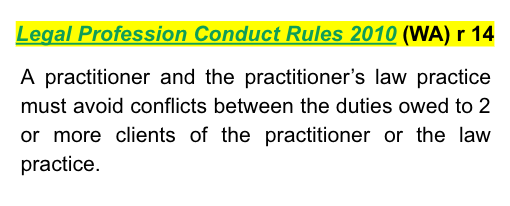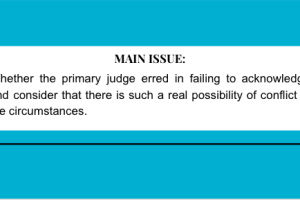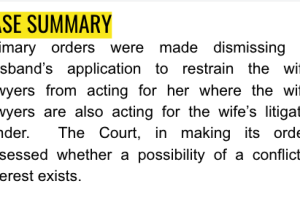- · 4748 friends
Husband Seeks to Restrain Wife's Lawyers from Litigation

Charisteas & Charisteas [2022] FedCFamC1A 160 (7 October 2022)

Primary orders were made dismissing the husband’s application to restrain the wife’s lawyers from acting for her where the wife’s lawyers are also acting for the wife’s litigation funder. The Court, in making its orders, assessed whether a possibility of a conflict of interest exists.

Facts
The wife was the applicant for property settlement orders, with the husband being the first respondent. There are 12 other respondents and two third parties in the proceedings. The first third party is AF. It is a commercial litigation funder and has provided litigation funding to the wife. On 10 October 2014, AF obtained a judgment against the wife and her two daughters (who had guaranteed the advance) for $2,234,741.29, with interest accruing thereon until payment.
AF was joined to the proceedings as a third party on 13 July 2018 and seeks orders that it be paid out any money payable to the wife in the proceedings. Whilst the parties differed over the amount presently owed by the wife to AF, it is at least $3.6 million with interest accruing at the rate of 6 per cent per annum. Firm Y have been the solicitors for AF throughout the proceedings and Mr P has been instructed to appear on AF’s behalf. The wife’s former lawyers filed a Notice of Ceasing to Act on 8 April 2021.
After the remittal of the matter by the High Court, Firm Y and Mr P have been instructed by the wife. They also continue to act for AF. Additionally, in these proceedings, Mr P acts on behalf of both Firm Y and himself in respect to the restraints the husband is seeking, that is, to prevent them from further acting on behalf of the wife. Ms D has been instructed by Firm Y to act as junior counsel for the wife. She did not take an active part in this appeal. The contact between Ms D and the trial judge led to the orders being set aside and the matter remitted for rehearing. XYZ Pty Ltd, the third respondent, has joined Ms D as a third party to the proceedings and seeks a costs order against her and the wife jointly or severally in relation to its costs of the trial in 2016.
In 2011, property settlement orders were made under s 79 of the Act (“the 2011 Property Orders”), which amongst other things, provided for the early vesting of an identified trust (“the Trust”). Upon its vesting and prior to any distribution, the husband’s mother, who was a general beneficiary of the Trust, was to receive a payment of $338,000 and following this, the trustee was to distribute the trust fund and income in accordance with the trust deed between the husband, the wife and their three adult children (“the Early Vesting Orders”). In April 2013, the Full Court of the Family Court of Australia (as it was then known) set aside the Early Vesting Orders on the basis that the husband’s mother had been denied procedural fairness. It was subsequently determined by a judge of the Family Court of Western Australia that the 2011 Property Orders were not final orders and that the Court retained jurisdiction to make property settlement orders under s 79 of the Act.
In March 2016, the trial judge, who has since retired, listed the matter for final hearing on 3 August 2016 in respect to the question of what final property settlement orders should be made. That trial was protracted, with the trial judge delivering judgment and making final orders under s 79 of the Act on 12 February 2018 (“the 2018 Property Orders”). That judgment was appealed for reasons which included alleged apprehended bias on the part of the trial judge. This was due to the contact between his Honour and Ms D, who was then junior counsel for the wife. Of concern was that the contact occurred during the course of the proceedings and in the period in which judgment was reserved.
The High Court set aside the orders made on 10 February 2015 and the 2018 Property Orders, and remitted the matter for rehearing, noting that the rehearing should address the Early Vesting Orders. The wife had indicated that she is not in a position to pay for the services of Firm Y, Mr P and Ms D, so AF is providing her with an indemnity. In practical terms, AF is paying her legal fees. The lawyers assert that if they were not to act for the wife under the present arrangement, no one would.
The primary judge found that the wife could not afford to pay her lawyers and had exhausted all potential lenders of funds. On the other hand, whilst the husband’s position was that he could barely afford to make ends meet, he had significant income and was able to pay his own legal fees (at [79]). In those circumstances, her Honour was satisfied that it was appropriate to make the costs order as sought.

Issue
Whether the primary judge erred in failing to acknowledge and consider that there is such a real possibility of conflict in the circumstances.

Applicable law


(a) Acts upon a wrong principle;(b) Allows extraneous or irrelevant matters to guide or affect the decision;
(c) Mistakes the facts;
(d) Fails to take into account some material consideration; or
(e) Makes a decision that, upon the particular facts, is unreasonable or plainly unjust.

Analysis
The wife currently owes AF, as at 30 April 2022, the sum of least $3.6 million and AF has an interest in ensuring that the adjustment of the parties’ property sought by the wife pursuant to s 79 of the Act is reflected as a transfer of property to the wife, rather than the settlement being structured on an alternative basis. Such an alternative would be to maximise non-property or cash benefits to the wife such as, for instance, the wife receiving a greater adjustment of superannuation in her favour which may be beyond the claim of creditors including AF. Additional options could be structuring any settlement such that the orders provided for the wife to receive ongoing periodic payments of spousal maintenance rather than a lump sum amount, or even, potentially, an entitlement to occupy property for an indefinite period or possibly life. Yet a further alternative would be to provide for distributed property to be held in a discretionary trust for the benefit of the wife and her children.
At the time of the hearing before the primary judge, it was acknowledged that an application was pending in the Supreme Court of Western Australia in the matter of AB v FGH [2022] WASC 244, in which the wife obtained relief of that nature in respect to a family provisions claim that she made against the estate of her late father. An additional and related potential conflict is the fact that the wife’s two daughters, who are the seventh and eighth respondents in these proceedings, are guarantors of the debt payable by the wife to AF. This places the wife in an uncomfortable position. One incentive for adopting a structure that maximises the adjustment of property and/or cash to her, rather than some alternative structure, is the real possibility that AF will pursue the wife’s daughters for the balance of monies payable by her pursuant to the guarantee.
While superficially there is a coincidence of interests, it leaves the wife vulnerable to her emotional concern for her daughters’ interests rather than her own interests exclusively. It is in the interests of the wife to have her own independent legal advice and representation to consider and navigate these complexities.
Conclusion
The appellant is granted leave to appeal. The appeal is allowed. The first respondent shall not, in these proceedings, instruct the same lawyers who are instructed to act for AF Business. Ms D shall not, in these proceedings, represent the first respondent. Orders 12–16 made on 19 April 2022 are set aside. The first respondent’s application for an interim costs order against the appellant is remitted for rehearing. Within 14 days of the date of these orders, the parties are to confer in respect to costs and in the event an agreement is reached, the parties have liberty to approach the Western Appeals Registry with a proposed minute of consent orders. In the event of the parties being unable to reach an agreement in respect to costs, within 28 days of the date of these orders, the parties are to file written submissions of no more than two (2) pages as to what costs order, if any, should be made in respect to the appeal.

















